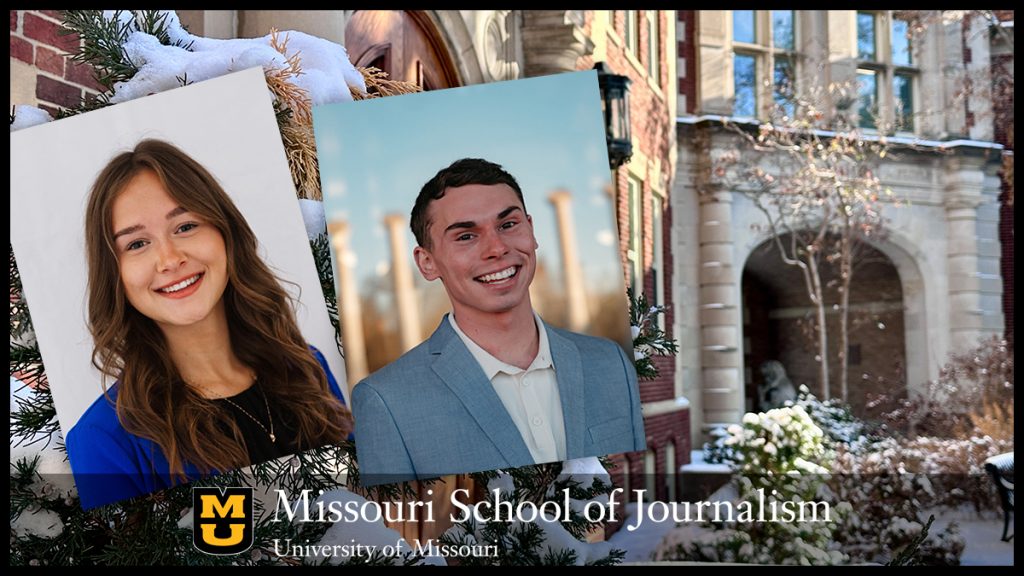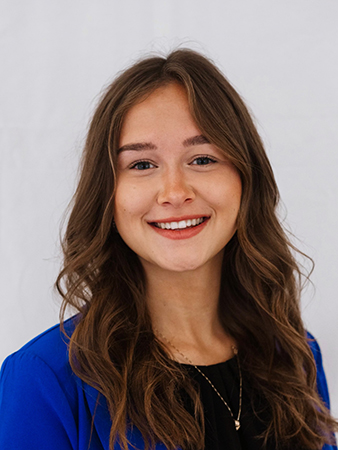Journalism students fast-track their careers and gain invaluable experience in the MU Graduate School

The Missouri School of Journalism awarded its first master’s degree in journalism in 1921. Today, students and practitioners take a journey of personal growth and professional development in news and strategic communication.
Through the School of Journalism’s accelerated program, undergraduates complete graduate coursework while finishing their bachelor’s degree, allowing them to earn an advanced degree just one year after graduation.
For students like Olivia Plangger and Will Wehmer, BJ ‘24, the accelerated master’s program provides an opportunity to fast-track their careers while gaining invaluable experience. Here are five reasons why students choose to pursue their graduate degrees, and how the program helps them stand out in the field.
Choose your interests, chase your passions
Plangger recently completed her first semester as an accelerated graduate student studying strategic communication. Before enrolling, she hadn’t realized the degree of personalization and freedom she’d have in selecting a research topic.
“Because of my interest in advertising and public relations, I’m currently exploring the intersection of cancel culture and influencer marketing,” Plangger said. “This flexibility has allowed me to tailor my studies to my own passions, making the experience even more fulfilling.”
Plangger found this flexibility shaping her research question while exploring topics she’s passionate about gave her a sense of ownership over her learning.
This freedom and personalization are important for the success of the student, said Earnest Perry, School of Journalism associate dean for graduate studies and research. With so many opportunities available, faculty and staff are ready to support students along their journey.
Mentorship with experienced and supportive staff
For Wehmer, the most rewarding part of his graduate studies journey has been the mentorship found in the professors.
“Nick Mathews has been the most influential in my path as an accelerated student,” Wehmer said. “He’s very detailed and has helped me find my interest within the courses I’ve taken and has worked alongside me to ensure that I’m succeeding.”
Accelerated students typically complete their degree in 18 months. In such an intense program, it’s important for students to have faculty and staff in their corner.
“The time students spend with faculty is not just important for what they’re doing while they are in the program, it’s also important for setting them up for what will happen after they complete their degree,” Perry said.
In Plangger’s experience, mentorship has been a constant source of support in her first semester.
“Whether I was sifting through various research interests, switching my focus to ensure I chose the right topic, reviewing past studies or refining multiple drafts of my literature review, the combined insights and encouragement from professors Nick Mathews, Jamie Flink and Jon Stemmle have made a huge difference in my first semester,” Plangger said.
Learning-by-doing
Experiential learning opportunities working with real clients truly make the Missouri School of Journalism graduate degree stand out across the nation. The Missouri Method — learning by doing — is a concept familiar to both undergraduate and graduate students.
Missouri Journalism operates the only network affiliate (NBC) television station in the country, a community daily newspaper, four major news media websites, a local magazine and an international magazine. Strategic communication students have created advertising and public relations campaigns for Nokia, Apple, Dr. Pepper and more.
“Whether you’re working at the Columbia Missourian, KOMU or engaged with documentary journalism, they provide news and information to the general public that can’t be duplicated by any other program,” Perry said.
These opportunities are only the beginning for journalism students who carry out their graduate coursework. The journalism school also operates educational programs in Washington D.C., New York and Brussels where students can complete their capstone projects and research.
“The Missouri Method continues to be a cornerstone of my Mizzou experience,” Plangger said. “This past semester has been particularly unique for me because it was my first semester balancing undergrad and graduate work. This dual focus — combining graduate-level theory with practical, real-world application — embodies the Missouri Method at its finest and helps me grow both academically and professionally.”
Enhance research and professionalism skills
Students diversify their professional portfolios and receive high-level theoretical and contextual education so they can understand on a deeper level how the material connects with the larger media ecosystem.
“If you’re interested in doing research, either as a part of your professional job or if you plan to go into academia at some point down the road, you’re picking up those research skills that really make you stand out in a very competitive field,” Perry said.
Students learn how to create surveys, run focus groups and conduct experiments. These skills will prepare students to engage with audiences, use data and delve into topics that help others understand the bigger picture, Perry said.
“Within the program, learning how to research properly has helped push me ahead of my peers and understand how to not only read, but digest material,” Wehmer said. “This will definitely help me as I move into a post-grad role as it’ll push me to use my skills to help others in strategy sessions.”
Personal growth and self-discovery
Plangger is balancing the demands of graduate school, along with her roles as an account manager for MOJO Ad, vice president of internal communications for Public Relations Student Society of America and a part-time job. Her resilience, organization and perseverance has led to self-discovery that many students experience in the graduate program.
“This semester taught me that it’s okay not to have all the answers upfront,” Plangger said. “The research process is iterative, and each step – even the frustrating ones – contributes to growth. I’ve grown as a learner, and this semester has reinforced the importance of reaching out for help when needed.”
When considering if a graduate degree in journalism is a good fit for you, think about your purpose, Perry said.
“Make sure you understand why you are going to pursue your graduate degree. It’s not what you did in undergrad. It’s much more intense. It’s more time consuming, but it does add value,” Perry said.
Updated: February 28, 2025

